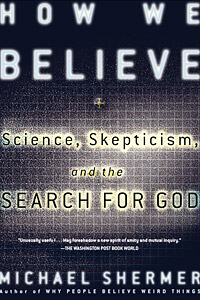How We Believe
Order from Skeptic.com
ORDER the paperback book
ORDER the audio recording
About the book
This new edition coversthe latest scientific research on how the brain makes us believers or skeptics. Recent polls report that 96 percent of Americans believe in God, and 73 percent believe that angels regularly visit Earth. Why is this? Why, despite the rise of science, technology, and secular education, are people turning to religion in greater numbers than ever before? Why do people believe in God at all?
These provocative questions lie at the heart of How We Believe , an illuminating study of God, faith, and religion. Bestselling author Michael Shermer offers fresh and often startling insights into age-old questions, including how and why humans put their faith in a higher power, even in the face of scientific skepticism. Shermer has updated the book to explore the latest research and theories of psychiatrists, neuroscientists, epidemiologists, and philosophers, as well as the role of faith in our increasingly diverse modern world.
Whether believers or nonbelievers, we are all driven by the need to understand the universe and our place in it. How We Believe is a brilliant scientific tour of this ancient and mysterious desire.



December 29th, 2008 at 10:51 pm
[…] I steal this observation from Michael Shermer, who talks about it in more detail in How We […]
May 25th, 2009 at 12:31 pm
On p. 259 you say: “(roughly) 60% practicing scientists…according to a 1966 survey by Ed Larson, have no belief in God or an afterlife.” That is misleading. 60% expressed a disbelieve in “God” as defined. The definition was chosen quite some time earlier by an opponent of a belief in God, who apparently chose a definition that would most likely receive a negative reply. In fact, I am surprised that 40% answered “yes.” Many marginally religious people take “God’s answering prayer” to mean that God gives one what one asks for. Not many deeply or professionally religious people hold that; in fact, such a belief does not make sense if one believes in God with a universal interest. Furthermore, “belief in life after death” (also part of the questionnaire) is not very useful for a definition of a belief in God. Even quite conservative Christians hold that eternal life does not come “after” death, since it is not a temporal matter.
Incidentally, your recent essay “Agenticity” in Scientific American fails to mention what Hood says about ethics. Thus I get the impression of a one-sided use of sources (others do that, too, of course).